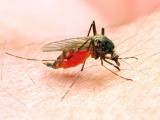April 28, 2005 (CIDRAP News) Just in time for mosquito season, federal health officials today heralded the addition of new defensive weapons against West Nile Virus (WNV): two non-DEET mosquito repellents.
Centers for Disease Control and Prevention (CDC) officials held a teleconference to announce they have endorsed the repellents picaridin and oil of lemon eucalyptus as effective tools for fending off mosquitoes that can carry WNV and other pathogens.
Both chemicals have been used successfully in other countries, said Dr. Lyle Petersen, director of CDC's division of Vectorborne Infectious Diseases (VID). They are comparable to varying levels of DEET, the chief repellent that has been used in the United States. And both have been approved by the Environmental Protection Agency.
"These additional repellents will help prepare people to prevent mosquito bites this summer," Petersen said.
Today's recommendation marks a policy shift for CDC, which has long recommended DEET-containing products to repel mosquitoes. In fact, the CDC's WNV page still contained a graphic of DEET this afternoon with the words, "Remember to use repellent with DEET when spending time outdoors."
While they still affirm the safety of DEET, officials acknowledged that some people just don't like the product. Alternatives have existedpicaridin was approved by the Environmental Protection Agency (EPA) for US use years ago, a CDC official saidbut there was little commercial interest. With the advent of WNV, mosquito repellents are getting more attention.
Both picaridin and the plant-based oil of lemon eucalyptus are EPA-approved for use as directed, said Dr. Emily Zielinski-Gutierrez, a behavioral scientist with the CDC's VID division. Picaridin, also known as KBR 3023, will be sold as "Cutter Advanced." The substance provides protection that is "often comparable with DEET products of similar concentration," a CDC news release says.
A CDC fact sheet on insect repellents says DEET and picaridin have shown a higher level of efficacy in peer-reviewed studies than other repellents the EPA has approved for safety and efficacy.
In two recent studies, oil of lemon eucalyptus provided about the same protection as low concentrations of DEET against mosquitoes found in the United States, according to the CDC. The substance, also known as PMD, is available in several products in the United States. The product has not been tested against mosquitoes that spread malaria and some other diseases that occur internationally, the agency says.
CDC's new advice reflects a concern that more people need to take precautions against WNV, a mosquito-borne disease that has spread to 47 of the 48 contiguous states since first appearing on US soil in New York City in 1999. Washington state is the holdout, but Petersen said he wouldn't be surprised to see WNV appear there this year.
Zielinski-Gutierrez said only about 40% of people reported using mosquito repellent when surveyed late last year. Use in the Pacific Northwest and among Latinos is particularly low, she added.
"There are a great many people who are unprotected against mosquito bites," she said. "West Nile Virus can be a terrible disease. It's worthwhile to take those few seconds to reduce your risk of becoming infected."
Petersen said localized outbreaks of WNV are hard to predict and may depend on weather and other factors. That's one reason personal vigilance is the key to good protection. The CDC recommends that people use insect repellent anytime they go outside during mosquito season, especially at night, when mosquitoes are most active.
Most people who contract WNV experience no symptoms, but about 20 percent can have symptoms such as fever, headache, nausea, and vomiting. About 1 in 150 people can suffer a severe illness, which may involve high fever, stupor, coma, tremors, convulsions, vision loss, and paralysis, the CDC said. In 2004, 2,470 Americans fell ill with WNV and 88 of them died. However, milder cases are believed to be underreported, Petersen said.
See also:
Apr 28 CDC news release
http://www.cdc.gov/media/pressrel/r050428.htm
CDC's "Updated information regarding insect repellents"
http://www.cdc.gov/ncidod/dvbid/westnile/RepellentUpdates.htm
CDC WNV pages
http://www.cdc.gov/ncidod/dvbid/westnile/index.htm
Dec 29, 2004, CIDRAP News report on WNV activity in 2004
http://www.cidrap.umn.edu/cidrap/content/other/wnv/news/dec2904wnv.html















